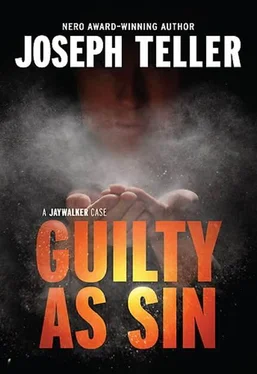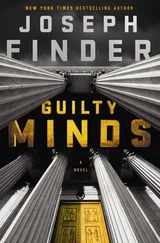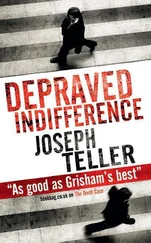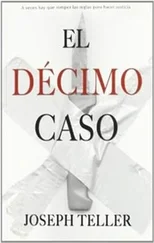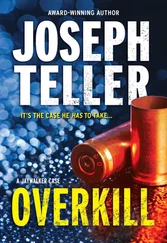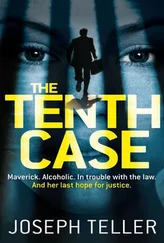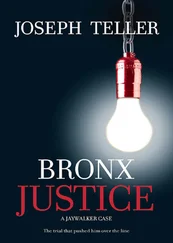Joseph Teller - Guilty As Sin
Здесь есть возможность читать онлайн «Joseph Teller - Guilty As Sin» весь текст электронной книги совершенно бесплатно (целиком полную версию без сокращений). В некоторых случаях можно слушать аудио, скачать через торрент в формате fb2 и присутствует краткое содержание. Жанр: Криминальный детектив, на английском языке. Описание произведения, (предисловие) а так же отзывы посетителей доступны на портале библиотеки ЛибКат.
- Название:Guilty As Sin
- Автор:
- Жанр:
- Год:неизвестен
- ISBN:нет данных
- Рейтинг книги:5 / 5. Голосов: 1
-
Избранное:Добавить в избранное
- Отзывы:
-
Ваша оценка:
- 100
- 1
- 2
- 3
- 4
- 5
Guilty As Sin: краткое содержание, описание и аннотация
Предлагаем к чтению аннотацию, описание, краткое содержание или предисловие (зависит от того, что написал сам автор книги «Guilty As Sin»). Если вы не нашли необходимую информацию о книге — напишите в комментариях, мы постараемся отыскать её.
Guilty As Sin — читать онлайн бесплатно полную книгу (весь текст) целиком
Ниже представлен текст книги, разбитый по страницам. Система сохранения места последней прочитанной страницы, позволяет с удобством читать онлайн бесплатно книгу «Guilty As Sin», без необходимости каждый раз заново искать на чём Вы остановились. Поставьте закладку, и сможете в любой момент перейти на страницу, на которой закончили чтение.
Интервал:
Закладка:
And the only answer Jaywalker had to that question was the same as he had to the first one. He would do his damnedest. He would spend the next day and a half trying to get twelve strangers to know Alonzo Barnett as well as he himself had gotten to know him. He would show them the man behind the criminal record, the man who’d somehow broken free of the revolving door of justice and finally made something of his life, only to be tripped up because, in a moment of blindness, he’d decided that no matter what the possible cost, honoring a debt was the right thing to do.
And while Jaywalker was busy trying to show all those things and more through the strange choreography of questions coupled with answers, maybe-just maybe-some clue would shake loose from the story, some pattern would emerge from the shadows, and he’d figure out how to win what until this moment looked like an absolutely unwinnable case.
JAYWALKER: How old are you, Mr. Barnett?
BARNETT: I’m fifty-one.
JAYWALKER: Where were you born?
BARNETT: I was born on a farm outside Forked Creek, Alabama.
JAYWALKER: How far did you go in school?
BARNETT: Not very far. About the middle of fourth grade, I guess. I was nine when they put me to work tending hogs.
It had always been Jaywalker’s belief that life stories count almost as much as facts do. Sure, he’d won acquittals for defendants whose backgrounds and demeanor combined to make them less than likable, but those acquittals had come hard, after long uphill battles. In Alonzo Barnett, he had a lot of raw material to work with. Here was a man who was good to look at, for starters. Even as he’d sat silently at the defense table, he’d projected an inner calmness, a quiet dignity. Once he’d begun speaking in a resonant baritone that hinted ever so slightly at a distant West Indian heritage, those qualities had been not only confirmed but reinforced. Add to all that a backstory about an impoverished, exploited childhood on a Southern farm and you had the whole package: a defendant fully capable of winning the jurors’ hearts.
Which was good, Jaywalker knew, but could get you only so far. Empathy was a great place to start, but it wasn’t enough to get you across the finish line. On the way, there were the facts to trip you up. Including the nastiest of them all, that Alonzo Barnett had indeed sold heroin to an undercover agent not once, not twice, but three times. So winning the jurors’ hearts wasn’t going to be good enough. If Jaywalker wanted to win their votes, as well, he was first going to have to draw them a road map showing them how to get there. And here he was, three questions into direct examination, and he still had no idea how to do that.
Then again, he couldn’t let a little thing like that stop him from trying, could he?
JAYWALKER: Had you learned how to read and write by the time you left Alabama?
BARNETT: No, I hadn’t.
JAYWALKER: Did you ever?
BARNETT: Yes, in my forties. In prison.
JAYWALKER: How old were you when you came to New York?
BARNETT: I was fourteen.
JAYWALKER: Who did you come with?
BARNETT: Myself. I came alone.
JAYWALKER: Who took care of you?
BARNETT: I took care of myself.
JAYWALKER: Where did you live?
BARNETT: Days, I lived on the street. Nights, I slept in a shooting gallery.
JAYWALKER: What’s a shooting gallery?
BARNETT: It’s where drug addicts congregate to shoot up heroin or smoke crack, and then sleep it off.
JAYWALKER: How did you support yourself?
BARNETT: Any way I could. When you’re fourteen, they don’t let you work legally, on the books. So you hustle, you do anything you can for a meal or a buck. Some kids, they steal or sell their bodies. Me, I swept the place up, cleaned the toilets, washed up the vomit, ran errands, whatever I could.
JAYWALKER: And did any of those errands you ran get you into trouble?
BARNETT: Yes, they did.
Jaywalker ran him through his rap sheet, beginning with his first arrest ten days after his fifteenth birthday and culminating in the charges he was on trial for. The jurors had known about Barnett’s record ever since jury selection, when Jaywalker had made a point of warning them about it. Still, he went into greater detail now, for a couple of reasons. The first was preemptive. He knew if he didn’t do it, Miki Shaughnessey would. The second was a little more counterintuitive. By having Barnett go into the particulars of his criminal past, Jaywalker hoped to demonstrate his client’s honesty through his willingness to let them know the bad stuff. A guy who’s going to level with you about having repeatedly broken the law is a guy you’re going to be likely to trust to tell you the truth-about everything. Finally, Barnett’s record, as long as it was, was the record of a drug seller. Almost all his arrests and convictions were for sale or possession. There were a few property crimes mixed in, but they were minor things. Nothing a Manhattan juror couldn’t take in stride.
Except, that was, for the two charges that jumped off the page, just as they had on Barnett’s arrival at Green Haven Prison a dozen years earlier. “Forcible Rape of a 15-year-old Female” and “Sale of a Controlled Substance on School Grounds,” they’d read. Jaywalker needed to defuse them by having Barnett explain the rather innocuous facts that lay behind the damning labels. At the same time, he needed the jurors to understand how those labels had instantly made Barnett a target, a man literally marked for death.
JAYWALKER: Who was the fifteen-year-old female?
BARNETT: Her name was Jasmine Meadows, and she was the mother of my son. She later became my wife, and we had two more children together, two daughters.
JAYWALKER: Are you still married?
BARNETT: No, I’m not. My wife died four years ago. She was killed by a hit-and-run driver while she was crossing Edgecombe Avenue.
JAYWALKER: What became of your son?
BARNETT: My son was killed in Vietnam.
JAYWALKER: And your daughters?
BARNETT: My daughters are eleven and nine. They’re in foster care right now. I see them on regular visits to my home. At least, I did until my arrest. And it’s my hope to be reunited with them, if things work out.
If things work out.
They’d settled on that phrase together, Barnett and Jaywalker had. They’d rejected “if I’m lucky,” “God willing,” “if the jury sees fit,” “if it’s written,” “if it’s meant to be,” “if it’s Allah’s will” and a dozen others.
They’d spent an hour deciding.
Add up enough of those hours and you begin to understand what it’s like to be a Jaywalker. But you’re also going to understand what it takes to win.
JAYWALKER: And the school grounds case. Were you in fact selling drugs on school grounds?
BARNETT: Yes, according to the law. But I honestly had no idea at the time. And I certainly wasn’t standing in a school yard or selling drugs to children, or anything like that. It turned out that the law on the books at that time said school grounds were anything within half a mile of any school.
JAYWALKER: Would you be surprised to learn that under that definition, you’re on school grounds right now?
Actually, Jaywalker had no idea if that was true or not. But he wasn’t about to let that stop him from asking the question.
SHAUGHNESSEY: Objection.
THE COURT: Overruled. You may answer.
BARNETT: No, it wouldn’t surprise me at all.
JAYWALKER: Yet those two charges remained on your rap sheet, which was in your file when you arrived at Green Haven. Is that correct?
BARNETT: That’s correct.
JAYWALKER: Would you explain to the jurors, as best as you can, the problem that that created for you?
It was an open-ended question, the kind that Jaywalker might have hesitated to ask an ordinary witness. But Alonzo Barnett was no ordinary witness. And if there was any chance whatsoever of winning an acquittal in this case, Barnett was going to have to do his share of the heavy lifting. No “Yes, sir” or “No, sir” answers were going to do the trick. He was going to have to sell himself to the twelve men and women sitting in the jury box, and he was going to have to do it in his own words. Or at least in words that he and Jaywalker had arrived at together.
Читать дальшеИнтервал:
Закладка:
Похожие книги на «Guilty As Sin»
Представляем Вашему вниманию похожие книги на «Guilty As Sin» списком для выбора. Мы отобрали схожую по названию и смыслу литературу в надежде предоставить читателям больше вариантов отыскать новые, интересные, ещё непрочитанные произведения.
Обсуждение, отзывы о книге «Guilty As Sin» и просто собственные мнения читателей. Оставьте ваши комментарии, напишите, что Вы думаете о произведении, его смысле или главных героях. Укажите что конкретно понравилось, а что нет, и почему Вы так считаете.
